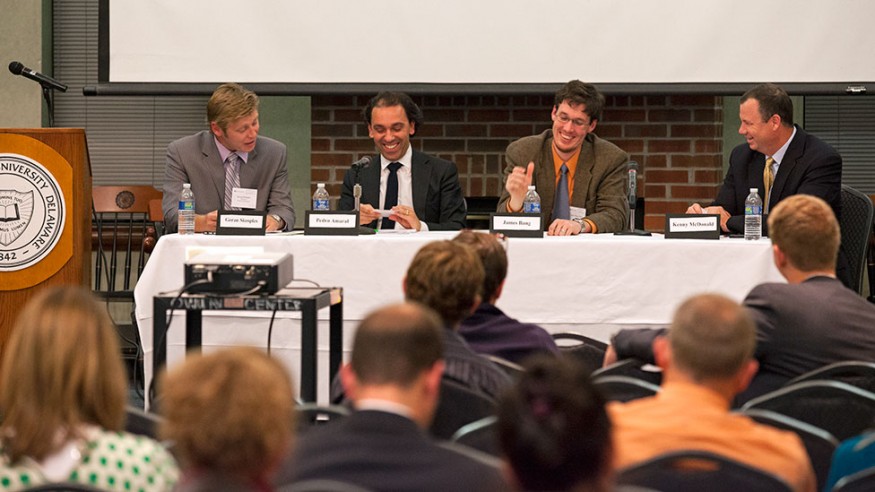
Economists Discuss Impact of Recession
Panelists for the 2012 Economic Outlook Conference included (left to right) OWU Assistant Professor of Economics Goran Skosples, moderator; Pedro Amaral; James Bang; and Kenny McDonald. (Photo by John Holliger)
Thought to be the worst financial crisis since the Great Depression of the 1930s, the recession in which the United States and our global partners have been entrenched since 2008, has seriously impacted the U.S. and world economy. Offering their views on the recession and initiatives which may offer promise for the future, was a panel of economists participating in this year’s OWU Economic Outlook Conference on October 11. Economics professor Goran Skosples moderated the conference.
Leading off with his thoughts about how the recession and financial crisis have impacted the world was James Bang, Ph.D., assistant professor of economics at St. Ambrose University. Bang noted that the region least affected was East Asia, which never shrank the way the U.S. did. Africa has been recovering well despite the global recession, and Latin America is growing robustly. The Middle East has shown a decline economically, and Eastern Europe and Central Asia remain seriously affected by the recession. Bang explained that there are more international links between countries today—much stronger than 30 to 50 years ago. He said that while recovery is under way, there has, however, been a 20 percent drop in world trade. Bang noted that in terms of how [college] students will be impacted, it appears that incomes of skilled people needed for certain jobs will go up. He added that returns on students’ college investment will increase over the course of their lives to the $2-$2.5 million range, and advised student to be savvy of politics, political institutions, and global affairs throughout their careers.
Pedro Amaral, Ph.D., senior research economist at the Federal Reserve Bank of Cleveland, talked about the outlook for the U.S. economy. He noted that the economy is expanding at a slow pace, but that it is a lackluster recovery. He believes it will take about three years to normalize the economy to a six percent unemployment rate and an inflation rate of not more than two percent. With a current unemployment rate of 7.8 percent, our recovery isn’t too bad, though it appears that many unemployed people are no longer seeking employment. It will be interesting, Amaral says, to see what happens [with the economy] in January.
Kenny McDonald, chief economic officer of Columbus 2020, tasked with building the economy in central Ohio, is an economic developer working with companies that want to expand and/or become more global. Of the 400 companies he recently has visited, about one-third are expanding and need skilled employees. McDonald helps to connect companies wishing to expand with necessary capital. He notes that since January 2010, more than 40,000 new jobs have been gained and unemployment in the Delaware and the surrounding area is at 4.9 percent. To keep the momentum, McDonald says the population base must grow, and college graduates must be encouraged to stay and work in the area. McDonald noted the importance of initiative and said that the future is “in our hands.” He cited the examples of Honda being located in Marysville, Ohio, as a story portraying the importance of business initiative and growth, and the fact that there are 18,000 job possibilities in the Columbus area waiting to be filled. Opportunities exist, but must be pursued.
OWU’s Economics Outlook Conference is co-sponsored by the Department of Economics and by the Woltemade Center for Economics, Business, and Entrepreneurship.
